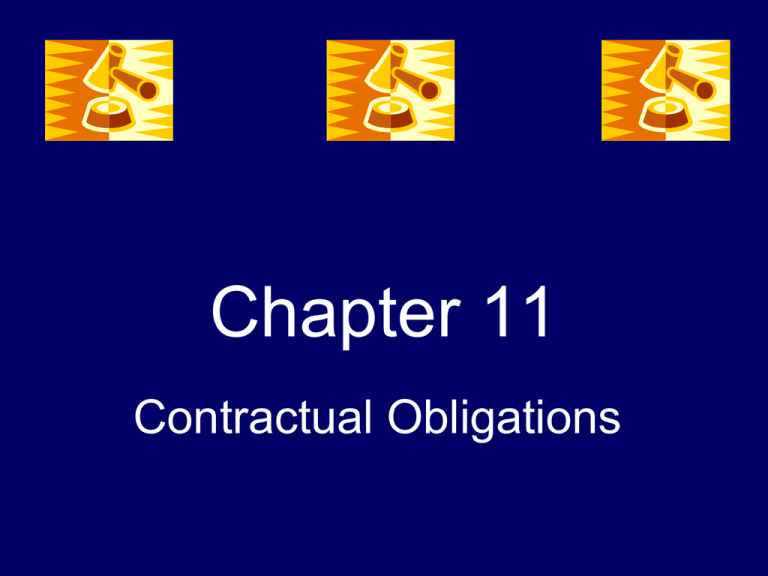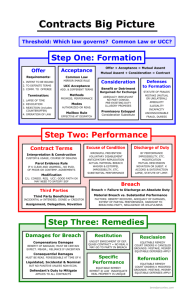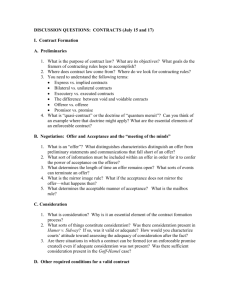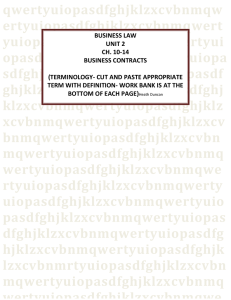Business Law - UDHS Business
advertisement

Chapter 11 Contractual Obligations 11-1 Transfer and Discharge of Obligations Transfer of Contract Rights/Duties • Assignment: transaction by which a party transfers contractual rights to another I.e. One party may transfer to another the right to collect a payment. Example ~ What’s Your Verdict? Pg.191 Assignor: The party who transfers the contractual right. (Boss Motors) Assignee: The party who receives this contractual right. (Palmout) What’s Your Verdict? ~ Pg. 191 Is such a transfer of contract rights legal? It was legal for Boss Motors to assign to the finance company its rights to receive Whipple’s payments in return for needed cash. When Whipple was notified of the assignment, he became obligated to pay the finance company instead of Boss Motors. Transfer of Contract Rights/Duties • Obligor: one who owes a duty under a contract In all assignments, the assignor guarantees to the assignee that the assignor has a right to assign and that the assigned right is legally enforceable. However, the assignor typically does not promise that the obligor will perform as promised in the original contract. IF the obligor breaches, the assignee must sue for the breach. Assignable Rights A party may assign contractual rights to another as long as performance is not materially changed. • Performance: fulfillment of contractual promises as agreed (Whipple’s payment was to be sent by mail regardless of to whom, so the assignment was proper). Example: Retailers and restaurants assign to issuers of credit cards the right to collect the amounts due from customers who have used the cards. In exchange, the credit card companies immediately pay the retailers and restaurants. Non-Assignable Rights • Contractual rights may not be assigned if performance requirements would be materially changed as a consequence. Form of Assignments • Assignment of contractual rights usually is made voluntarily by the assignor. • While an assignment is valid whether oral or written, putting an assignment in writing is always wiser. • No consideration is necessary to make a valid assignment. Notice of Assignments • Until notified that an assignment has occurred, the obligor may continue to pay the assignor. • After notification, the obligor is liable to the assignee for performance. • To protect newly acquired rights, the assignee should promptly notify the obligor of the assignment. Delegation of Contractual Duties • Delegation of Duties: routine obligations of a party that must be performed to fulfill a contract can often be transferred to another to perform. • However, a person who delegates contractual duties remains legally obligated and responsible for proper performance even though someone else may do the required work. CHECKPOINT Under what conditions may you assign contractual rights to another person? Contract rights may be assigned as long as the performance requirements will not be changed in a material way. Discharge by Performance • Performance is a series of activities that fulfills the purpose of the contract. • Time for Performance ~ the time for completing a contract may be important to both parties. – If time is not stated, the court will say that all duties must be completed within a reasonable time. – If time is stated, the court may still give more time. Discharge of Contractual Obligations ~ By Performance • Discharge of a contract is a termination of duties that ordinarily occurs when the parties perform as promised. • Most contracts are discharged by complete performance of the terms of the contract. • Breach of Contract - Failure to provide complete performance By Performance • Substantial Performance: when just about all the duties are performed but a minor duty under the contract remains. • Anticipatory Breach: when a party who defaults (fails to perform), notifies the other party to a contract before the time of performance has arrived that he or she will not perform. • Timing of Performance: If a duty is not performed in a reasonable time, the non-performance is considered a breach. (e.g. shipping ripe tomatoes) By the Initial Terms When the parties prepare their contract, they may agree that it will terminate: 1. On a specified date or upon the expiration of a specified period of time (e.g. a fresh food supply contract with a school terminates on the last day of school) 2. Upon the occurrence of a specified event (e.g. a contract to have someone mow your yard until you return from vacation) 3. Upon the failure of a certain event to happen (e.g. a construction loan contract upon failure to get a required building permit) 4. At the free will of either party upon giving notice (e.g. when one partner decides to retire from business and gives the required notice) By Subsequent Agreement • Parties who have made a contract may mutually agree to change the contract/relationship by: 1. Rescission – By rescission the parties may agree to unmake or to undo their entire contract from its very beginning 2. Substitution – Parties may decide that the present contract is not what they want, and so replace it with a new contract. 3. Accord & Satisfaction – Accord: an agreement to substitute a new contractual obligation for an existing one if the new obligation is satisfactorily performed. Satisfaction: actual performance of new obligation 4. Novation – a party entitled to receive performance under a contract may release the other party from the duty of performance and accept a substitute party. What’s Your Verdict? ~ Page 192 • Will the court order Jan to pay the original amount or the $1,500? An accord and satisfaction discharges the previous obligation. If the performance in the accord is not rendered, the old contract remains in effect. • Jan failed to perform under the accord (to pay $1,500 by January 15), and so the original contract was not discharged. He still owes $2,000. By Impossibility of Performance • Refers to extreme external conditions rather than an obligor’s personal inability to perform. • Examples: – – – – a surprise war Unexpected embargo Natural disaster (flood or earthquake) Unique subject matter in contract is destroyed before delivery (Picasso is burned in a fire at auction house) – Performance because illegal before rendered (installing asbestos shingles on a new building) – Death / disability of someone who was to provide personal service that only that person could render By Operation of Law • A contract may be discharged or the right to enforce it may be barred by operation of law • Examples: – Person’s debts are discharged in bankruptcy – Time allowed for enforcement of the contract has elapsed because of the statute of limitations – Alteration: a material change in the terms of a written contract (intentionally) without the consent of the other party By Tender of Performance • Tender: a ready, willing and able offer to perform an obligation • Doing of an act: – A tender that is made in good faith but is rejected will discharge the obligation of the one offering to perform. • If the obligation requires payment of money: – Rejection of a tender to pay money does not discharge the debt nor does it prevent the creditor from collecting later. – Must consist of exact amount due in legal tender (currency or coins) 11-2 Remedies for Breach of Contract Breach of Contract • What can happen if a contract is not fulfilled? – A breach of contract is when a person fails to perform the duties spelled out by a contract. – When a breach of contract occurs, one party is injured and therefore the court will allow the injured party to bring an action for damages. Remedies for Breach of Contract • Remedy: action or procedure followed to enforce a right or to compensate for an injury Remedy for a Minor Breach • Only remedy generally available for a minor breach = MONEY damages • Party injured by minor breach must continue to perform the duties defined by the contract. • The amount of damages would be whatever it took to complete the minor duty left undone by the breaching party. Remedy for a Major Breach • If the breach is classified as a major breach, then the injured party need not continue to perform the duties defined by the contract. 1. Rescission and Restitution • Rescission: allows the parties to treat the contract as canceled • Restitution: permits each party to recover money or property (or the value thereof) given to the other party. Example: If a seller of realty committed a major breach by failing to deliver the deed, the buyer could sue for restitution and recover any money paid for the property. 2. Money Damages Money damages may be: • Compensatory: seeks to restore injured parties to the same financial position they were in prior to the breach. • Consequential: the court tries to place injured parties in the same financial position they would have been in if the contract had been performed. 2. Money Damages • Punitive – awarded by courts under certain circumstances, such as fraud or when an intentional tort is involved in a breach of contract. • Liquidated – when parties to a contract agree on a certain amount of monetary damages that will be paid if a particular contract breach occurs. 2. Money Damages • Nominal – When courts, even when no substantial harm has been done, award a token amount to acknowledge that a wrong has been committed. (Nominal damages are granted in recognition of the rights that have been violated). 3. Specific Performance Is when the only appropriate remedy for breach of contract is the decree (order) that the breaching party do exactly what was required under the contract. CheckPoint • Explain the remedies available for a major breach of contract. • The available remedies are: 1. Rescission/restitution 2. Damages 3. Specific performance What’s Your Verdict ~ Page 197 What remedies does Liu have from which to choose, and what is her optimal remedy? What’s Your Verdict? ~ Page 197 Liu can choose among the following remedies: • Rescission and restitution: Canceling the contract and returning whatever has been received under it. • Money damages: The payment of money to compensate for injury • Specific performance: A court order commanding the breaching party to perform what was promised in the contract. What’s Your Verdict? ~ Page 197 • Liu’s optimal remedy would be specific performance. • The court would order McCall to transfer title to the property with a properly signed deed delivered to Liu. Factors Affecting Choice of Remedy • • • • • Conflict of Remedies Duty to Mitigate Waivers Statute of Limitations Bankruptcy Conflict of Remedies • A party injured by a breach of contract must elect, or choose, a remedy when suing. • Electing to pursue one remedy will rule out pursuing another. Example: Specific performance and damages cannot be recovered for the same breach because specific performance is not available when damages are an adequate remedy. What’s Your Verdict? ~ Page 199 What remedies are available to the original team? Brushback’s original team could recover the two months’ wages ($20,000) as restitution. However, if the team elects this remedy, they would lost the ability to sue for damages and the ability to obtain an injunction to stop Brushback from playing for the competition. Duty to Mitigate • Mitigate the damages: Reasonable steps that have to be taken by a party injured by a breach of contract to minimize the harm done. Example: In most states, a landlord must take reasonable steps to re-rent an apartment vacated in breach of a lease. If an injured party fails to take reasonable steps to mitigate the damages, the amount of potential recovery is lessened by the amount that could have been mitigated. Waiver • Waiver: when a party intentionally and explicitly gives up a contractual right. Example: If one party consistently sends late payments and is not charged the late fee specified in the contract, the rights to collect a late fee on future payments may be waived. Statute of Limitations • Statutes of limitations: if a suit is not brought within a certain time after a legal claim, such as breach of contract, arises. • 4 years is a common time period for contracts • 3 years is a common time period for torts • Half the states allow more time to sue on written contracts than on oral ones. • Statute of limitations begins to run from the moment there is a right to sue for a breach. Bankruptcy • Bankruptcy: legal proceeding whereby a bankrupt’s estate is distributed among various claimants in order to discharge many of the bankrupt’s debts and give the bankrupt a fresh financial start. • Debtors can get a fresh start, and creditors share fairly in whatever assets are available. CheckPoint • What does it mean to “mitigate the damages”? • A party injured by a breach of contract must minimize the overall harm done by any legal means possible or whatever damages that could have been avoided thereby will be subtracted from any recovery.








